






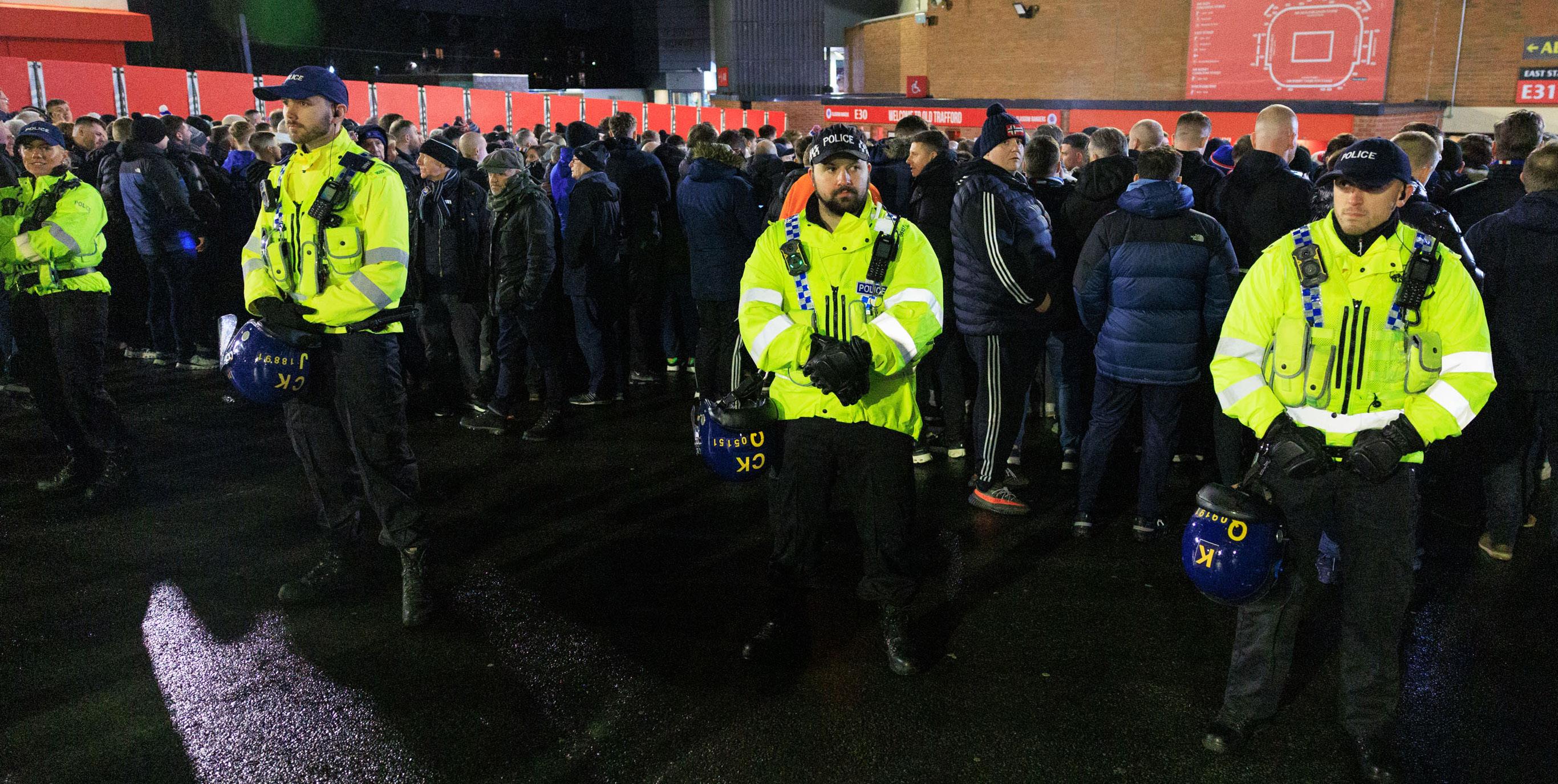
The theme for this month’s District Brief is the Major Incident Team (MIT).
The support of the MIT is critical to the success of district crime investigations even before MIT appear at a scene
First responses to allegations of crime have the potential to identify offenders and address their behaviour, to reduce other forms of risk of harm, and to enable the immediate identification and recovery of evidence.
Following this, MIT can provide specialist expertise, resources, and strategic oversight in complex cases, ensuring investigations are thorough, efficient, and compliant with best practices.
Their ability to manage large-scale enquiries, analyse extensive evidence, and coordinate multi-agency efforts is invaluable, especially in serious or high-profile cases such as homicides or organised crime.
A past example of this was the operation we saw in September 2023 after a firearms discharge in Trafford and the subsequent response we saw in collaboration between the MIT and district officers – working in tandem to reassure communities across Trafford and South Manchester. MIT support can also alleviate pressure on district teams by handling resource-intensive tasks like evidence collation, forensic analysis, and interview strategies. This in turn, allows local officers on district to focus on maintaining community relationships and addressing other district priorities.
Moreover, MIT’s experience in managing major incidents can help to ensure that cases are handled with precision, increasing the likelihood of securing convictions and delivering justice. Their contribution helps to reinforce public trust in policing and is a demonstration of the importance of collaboration and expertise in solving complex crime.
Thank you,
Superintendent Marcus Noden
On Thursday 23 January, over 70,000 football fans headed to Old Trafford to watch Manchester United play Glasgow Rangers.
Officers were out in force across Trafford and Manchester City Centre to ensure that everyone had a safe and enjoyable time.
More than 450 officers across GMP were deployed through the night with 39 arrests being made in total – the vast majority being before the game.
There were 26 arrests made in the Ancoats area of the city after some disorder broke out just after 6pm.
Further arrests were made on suspicion of drug offences, drunk and disorderly behaviour, tragedy chanting, and assault of a steward. There were no further incidents outside the stadium as supporters headed home.
ACC Sykes, match commander for the game, said: “I’d like to personally thank all our officers for their efforts, which helped to ensure the focus was
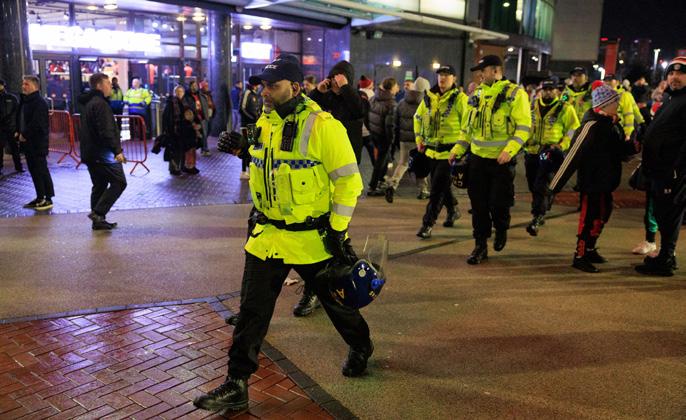
on the football and everyone was able to enjoy themselves safely.
“These high-profile fixtures are always exciting occasions, but they also naturally present challenges to ensure that the thousands of spectators can enjoy the game safely and to minimise disruption for the wider public.
“We did see some incidents before the game, which required a prompt response from our officers to prevent any further disorder and harm. Arrests were made and further disorder was prevented. Thank you for everything you do.”
Ensuring thousands of matchgoing fans arrive safely for such an event takes a considerable amount of planning, consideration, and dedication. GMP worked with both football clubs and their respective supporters’ groups in the months leading up to the game to ensure the match passed safely with as little disruption to the wider public as possible.

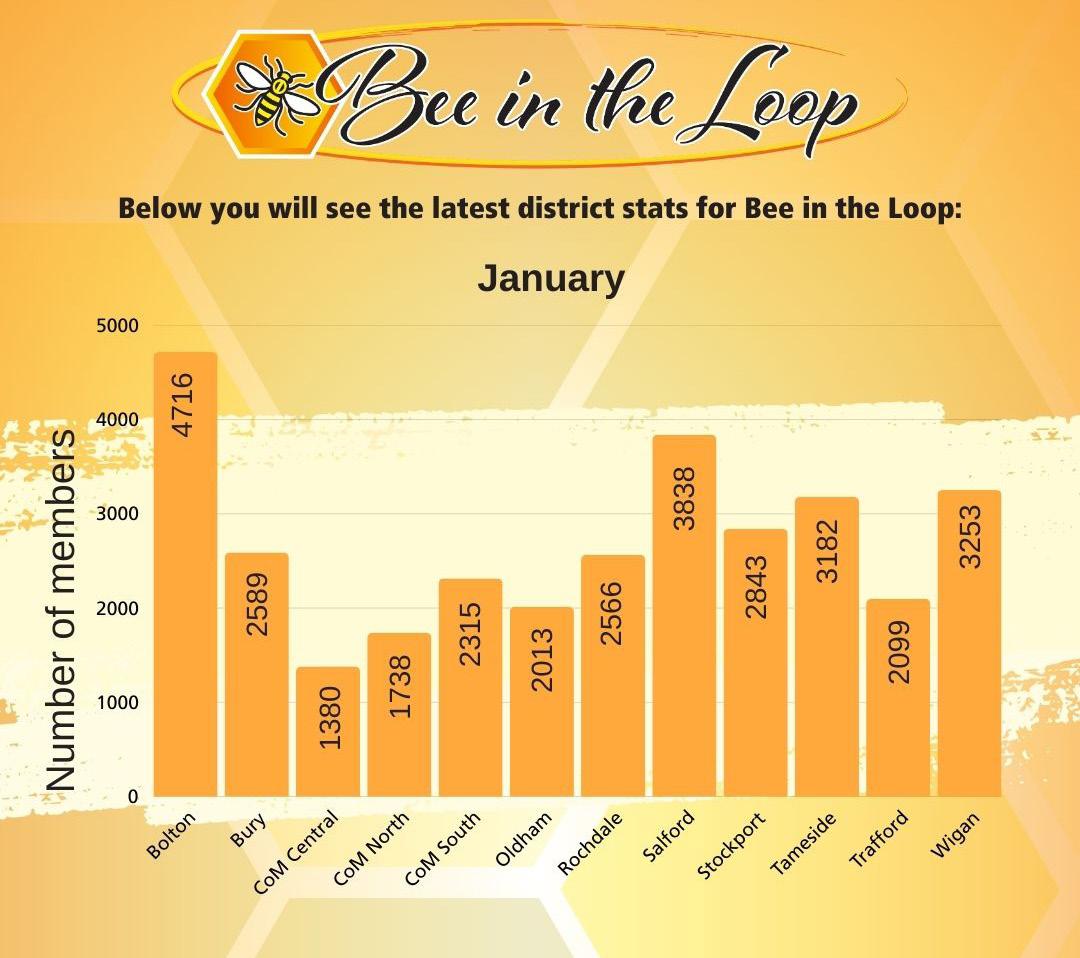
The BBC joined us in the city centre one evening in January, to see how GMP and the hospitality industry are safeguarding young people through increased engagement, education and test purchasing.
Over the course of the evening, we conducted several test purchases at various hotels across the city centre to see how they handled situations of potential exploitation in their hotel. Using a plain clothes officer as a suspect and a volunteer posing as an underage victim, we attempted to book a hotel room to see if the staff could spot signs of child sexual exploitation and take action to safeguard young people.
Overall, we could see that the majority of hotels had a good understanding of child exploitation, as a result of Operation Makesafe training; they challenged the test purchasers and refused to sell them a room before calling the police to report their concerns.
In one instance, employees failed to challenge the test purchasers or report suspicious activity to the police. A full debrief was conducted after this, and further training will be required to help them identify signs of child exploitation and understand the impact that allowing people to book a hotel room in suspicious circumstances can have.
The aim of the operation is to empower hoteliers and employees to feel confident in spotting the signs of potential exploitation happening in front of them and reporting it to the police so that we can act. These operations also help us to understand where there are gaps in the knowledge and training of hotel staff so that we can address these to ensure young people are kept as safe as possible.
Chief Superintendent David Meeney, District Commander for Manchester, said: “It is vital that we raise awareness amongst key local businesses as well as members of the public so they
can learn what to look out for, spot the signs, and ultimately help safeguard young people. Sometimes there may be a perfectly innocent explanation for a situation, but if we can protect even one vulnerable young person from harm, this initiative will have been worthwhile.”
Indicators of child sexual exploitation within the hospitality sector include, but are not limited to:
• Adults who appear secretive about their visit or try to conceal that they are visiting in the company of a child or young person.
• Arrival of young person with a boyfriend/girlfriend who appears older than they are.
• Refusal to provide identification or credit card details and attempting to pay in cash.
• Requesting an isolated room, a room close to a fire exit or a room with easy access to the car park.
• High levels of visitors to a guest room.
• Visitors arriving and asking for a specific room number without knowing the name the room is booked under.
• Refusal to have room cleaned or visited.
• Pre-paid bar tab or consumption of pornographic film channels in a room occupied by a child or young person.

As part of our ongoing drive to improve the way we engage with vulnerable victims and witnesses, including children, GMP will shortly launch a new process for arranging and conducting video interviews with children and vulnerable adults.
Ahead of the rollout of the new process, training sessions will be provided for anyone whose role involves dealing with victims and witnesses, including response, DIT, CID and CPIU.
The training will take place between Monday 10 and Friday 14 February, with sessions on each day from 10am to 11am and from 2pm to 3pm.
Each session will take around an hour, with training followed by a Q and A; the training will count towards continuous professional development (CPD) hours for detectives.
You can view a full list of links to each training session by scanning the QR code below.


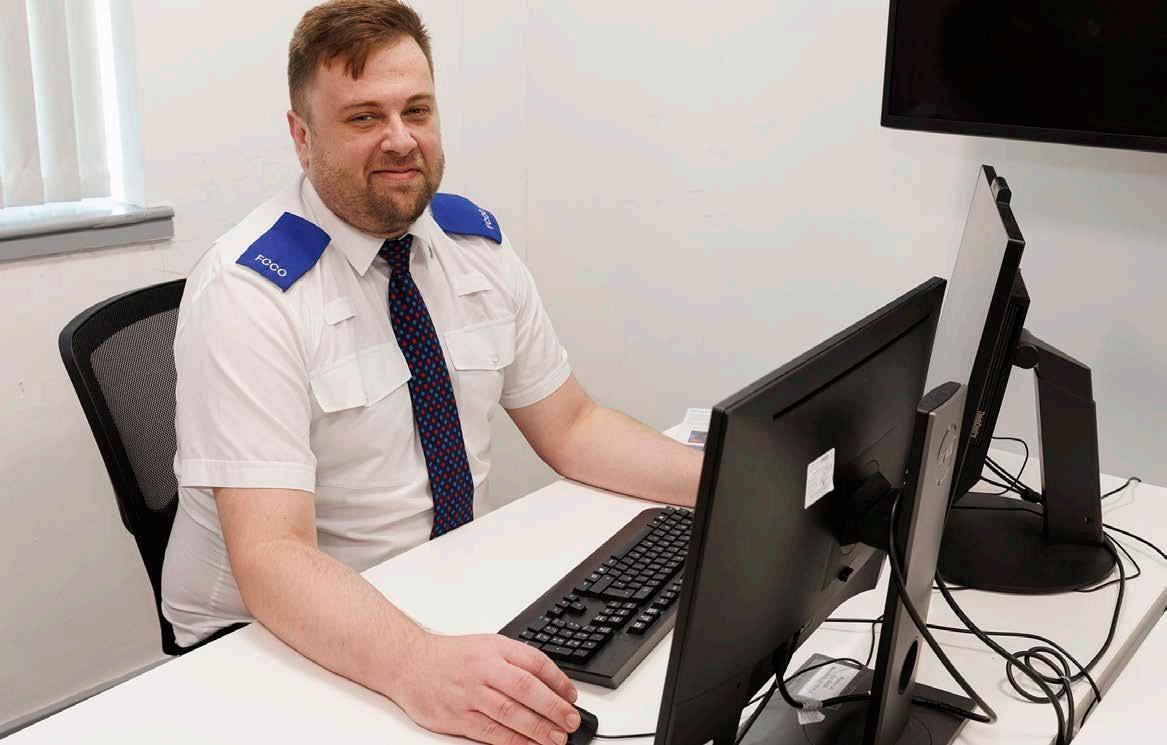
As Right Care, Right Person (RCRP) moves into its second wave, we spoke with Bradley Sone, a call handler at Claytonbrook FCCO, about the implementation of the initiative and its progress so far.
How do you feel about RCRP so far?
So far the introduction of RCRP in GMP has had a huge impact. There was a lot of worrying prior to launch, but the whole team seems to be on board now making sure the callers are directed to the most appropriate agency to help them. As a force we have had a drop in deployments to concern for welfare calls, freeing up patrols to go to other incidents; there has also been a drop in the number of concern for welfare jobs received from partner agencies, which are now more likely to contact the more appropriate agency as their first point of call.
What aspects have been positive for you?
For me the most positive aspect of RCRP is getting the caller the help they need. For so long the police have attended everything to try and help as best they can, but with this new process now in place the people of Greater Manchester can get the right help that they need.
What challenges have you encountered with RCRP since it was implemented?
My team specifically struggled with the changes to the missing persons policy [Operation Addition] rather than RCRP itself –they were both big changes to two big parts of call handling, and the missing policy change seemed to not be shouted about as much.
How did you overcome these challenges? Who or what helped you?
We communicated any challenges we encountered to the RCRP senior leadership team (SLT) and the subject matter experts (SMEs) in the room, who made amendments to the policy where appropriate and communicated changes so the new information could be filtered down. Throughout the whole implementation of RCRP there has been a lot of help and support available from the SLT and the SMEs.
How do you think the public feels about RCRP?
Members of the general public who I have spoken to or assisted with jobs all seemed happy with the change; a lot of the time on calls I have found that people were just unaware of who else they could call so they called the police, but when we pass on advice for who else to contact, they are happy to follow it.
What do you hope to gain from RCRP in the future?
By continuing with RCRP, we can continue to get the people of Greater Manchester the right help. As a result of fewer deployments for concern for welfare calls, we can attend more jobs in a given timeframe.
Are there any specific improvements or outcomes you are looking forward to?
The policy continues to be updated as we continue working with RCRP. The changes so far have all been appropriate, they haven’t added any extra work to the control room, and the room as a whole is more confident with RCRP. I cannot think of any specific improvements needed at this time.
GMP’s Association of Women in Policing (AWP) will be holding an International Women’s Day event on Friday 7 March 2025 at GMP Force Headquarters.
The event, which will take place in room 515 of FHQ from 9am to 3pm, will be opened by ACC Steph Parker and feature presentations from:
• Police History Society chair and former senior Metropolitan Police officer Kate Halpin QPM on the diverse history of women in policing
• Renowned academic Dr Sajjan Gohel on the role of misogyny in the ideologies that drive terrorism
• GMP Det Insp Hayley Riley and Ch Supt Colin McFarlane on the importance of workplace mentoring and female representation at the board level
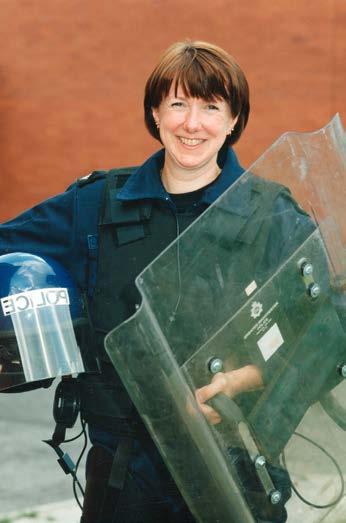
• GMP leadership trainer Rebekah Renshaw on professional development within policing
• Ruth O’Malley, head of data science at Counter-Terrorism Policing, on the value of police staff in complex investigations
Attendees will be able to visit stalls for support networks and bodies both within and outside GMP, and network with female colleagues from across the force. Food will be provided, with vegan and halal options available.
If you’re interested in attending the event, please email AWP@gmp.police. uk with your rank and division.
There are only 50 places available at the event, so get in touch as soon as you can!
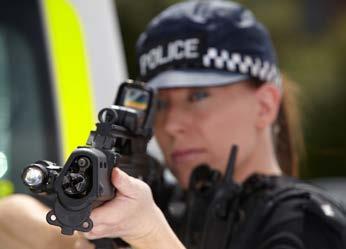

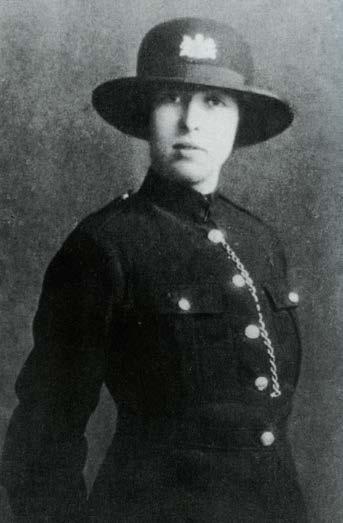
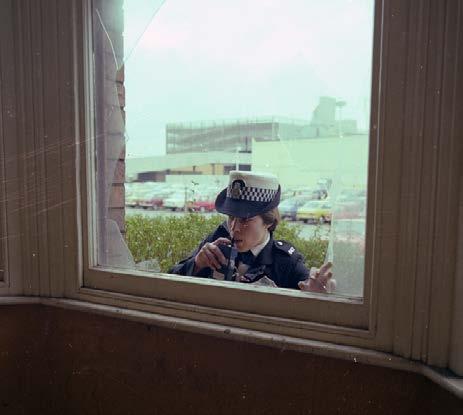
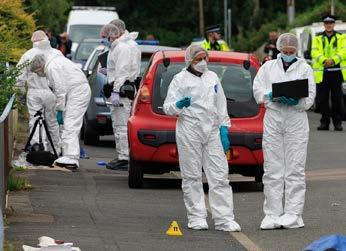
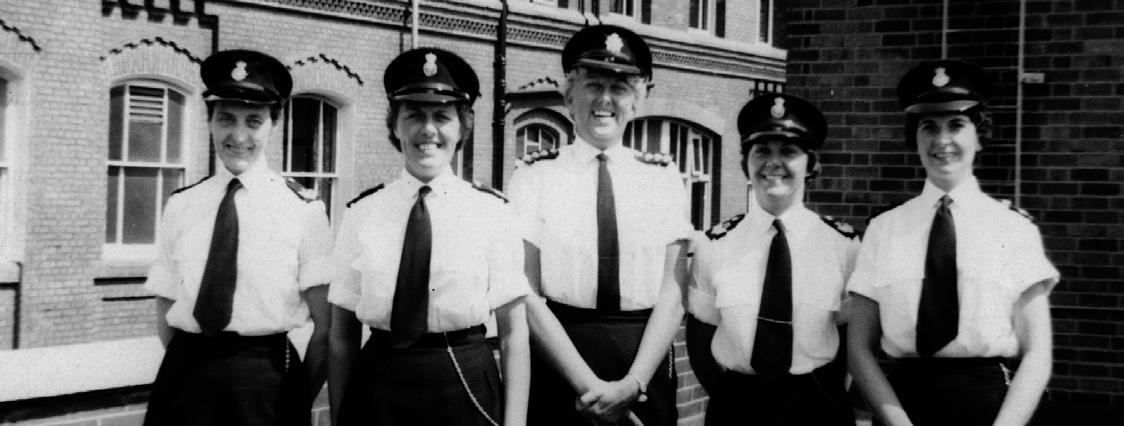
A new statutory Victims’ Code is now in effect, placing mandatory requirements on all police forces and criminal justice partners to provide consistent, high-quality support to victims throughout their journey through the criminal justice system.
In order to help embed the Code into GMP practice at all levels, for both police officers and staff, ACC John Webster (Criminal Justice and Custody) and Victims’ Services strategic lead Louise Sever have put together a video that provides a high-level overview of what the changes mean for us as a force
ACC Webster said: “These changes represent a major step forward in how we support victims of crime.
“The new Code puts clear obligations on us to provide better information, support and communication to victims, while working more closely with our partner agencies.
“Every contact with a victim is an
opportunity to build trust and confidence in policing.
“These new requirements will help ensure we provide consistent, professional support to every victim we encounter.
“Remember, supporting victims effectively isn’t just about following a code – it’s about providing the professional, empathetic service that victims deserve and that builds public confidence in policing.”
Key changes which officers and staff should be aware of include:
• A broader definition of ‘victim’ that includes those who have witnessed crime, those whose birth resulted from criminal conduct, those who have lost a close family member to crime, and children who are victims of domestic abuse.
• Mandatory compliance with the Victims’ Code, requiring us to provide specific services unless there are good reasons not to.
• New requirements to collect and share data about victim services with other criminal justice agencies.
• Specific obligations around notifying schools when we believe a child may be a victim of domestic abuse.
• Enhanced information sharing framework with clear guidelines on handling victim information.
You can view the video by scanning the QR code below.

The post-incident procedure (PIP) is a national process designed to guide GMP officers and staff who have witnessed or been involved with a death or serious injury (DSI) of persons following police intervention or contact, where there is no suggestion of misconduct or wrongdoing on behalf of the GMP employees involved.
The procedure is in place both to enable officers and staff to provide any independent inquiry with the best evidence that they can and to ensure that the welfare of any GMP officers or staff members involved in an incident of this kind is prioritised at all stages of the process. It has welfare at its core and offers an element of protection
to officers who have often acted with nothing but courage and professionalism in extremely challenging circumstance.
All GMP officers and staff should ensure they are aware of the PIP and how it works – DSI incidents could affect anyone, public-facing or otherwise, and irrespective of their role or rank.
Our Creative Media Imaging team has produced an informative video covering the key aspects of the PIP, to give you an element of confidence in the process in case you are ever involved in an incident in which a member of the public has either been killed or seriously injured.
You can watch it by scanning the QR code to the right.
Please be aware that the video contains graphic footage which some viewers may find upsetting or distressing.


The latest season of Channel 4’s behind-the-scenes documentary series Manhunt, which aired through January, focuses on teams at GMP as they investigate a series of cases.
The programme, which has been described as ‘absorbing…a low-key tribute to diligent police work’ by the i and ‘gripping’ by the Daily Mail, follows the progress of Operations Feverfew (investigating the February 2022 kidnap and murder of Christopher Hughes), Southsea (the hunt for the killers of Neri Morse, who was stabbed in Ancoats in November 2022) and Bure, which sees officers respond to intelligence that a man is planning to attend a large public event with a gun.
Op Feverfew, the subject of the first


episode of the series, is the complex investigation into the kidnap and murder of Christopher Hughes in February 2022. The documentary crew follows the work of DI Justin Bryant and his team at GMP’s Serious and Organised Crime Group following an initial 999 call reporting a man being forced into a car in Wigan, as they piece together evidence and deploy resources to locate Christopher and his abductors. Once a body is found, the missing persons case becomes a murder investigation; and the team must uncover what happened –and why.
The second episode follows Operation Southsea, which sees the Major Incident Team spring into action when a stabbing on a busy street in broad daylight leaves
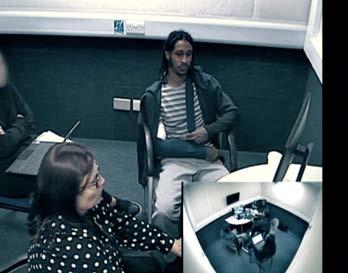
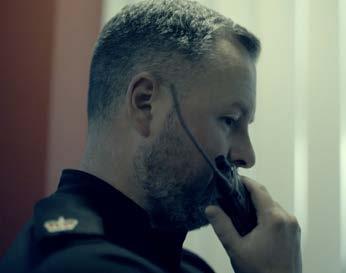
24-year-old Neri Morse dead and three suspects nowhere to be found. The team calls in specialist intelligence officers to track the fugitives before they strike again.
The third and final episode focuses on Operation Bure, an investigation into intelligence that a man was planning to attend an event with a gun. In the space of only a few hours, officers must respond proactively and dynamically to locate the potential offender and mitigate any threat he poses to the public.
Every episode of Manhunt is now available to stream at https://www. channel4.com/programmes/manhuntdocumentary.


GMP’s ongoing evidential property management (EPM) streamlining project was introduced to support with the reduction of serious risks to the retention and accessibility of evidential property across the force. One key area of focus is the significant volumes of destruction backlogs being held across the force, with around 44,000 evidential holdings currently awaiting further action or disposal. Backlogs like this significantly increase the risk to GMP, and therefore a key focus has been placed on streamlining and stabilising the EPM stores and their content.
Under the EPM ‘streamline and sustainability’ plan, a performance dashboard was created to support with the identification of high risk and priority areas within the evidence property management system, ensuring that the project team was dealing professionally

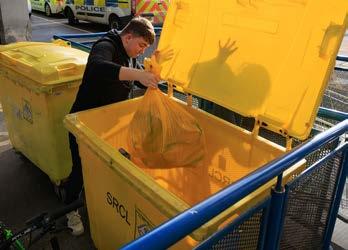
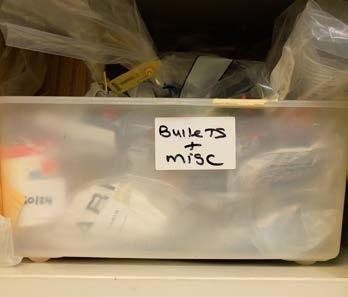
with the management of evidence, to safeguard its integrity in support of the prevention, reduction and detection of crime, keeping people safe, and caring for victims. Weekly SPOC meetings were introduced to share challenges, review ideas and ensure urgent actions were reviewed regularly.
These initial solutions will now be followed by a series of localised days of action, which will see some evidence storage facilities temporarily close for a few days to allow the project team, EPM store staff and divisional officers work collaboratively to reduce existing backlogs. On the first of these, a ‘proof of concept’ session at Oldham which began on Monday 27 January, the team was able to reduce the current backlogs from 3,595 destruction items to 633 over a three-day period.
Senior Change Project Manager Lisa Semple, who is overseeing the project,
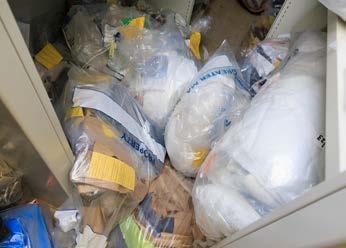
said: “We’re already very pleased with these initial results, and we’re looking forward to further successes throughout the first half of 2025.
“The Oldham day of action follows on from a series of SPOC-led actions in 2024 which saw reductions in disposals of 60% at Longsight; 55% at West Didsbury; 47% reduction at Oldham and 43% at Wigan. Our overarching goal is to reduce the 44,000 holdings down to around 9,000 items.”
The days of action will be complemented by the introduction of proactive stock management practices aimed at preventing backlogs from building up again, including the introduction of standard operating procedures, store targets, daily performance meetings and a weekly Gold meeting to track store performance and identify early on any challenges which may pose a risk to backlog volumes.
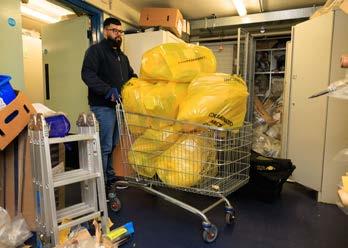


In late January, a GMP officer was seriously injured when a vehicle hit her at speed while she was investigating to a report of suspicious behaviour in Cheadle. A man has been arrested on suspicion of attempted murder.
Ch Insp John Picton of the Stockport district said: “This incident is truly shocking and shows how quickly situations our frontline officers attend can escalate. Our officers go to work every day to provide an outstanding service to the communities they serve, and achieve fantastic results in situations that are often challenging. Our investigation is continuing and the officer is being supported by all of us at the Stockport district; she is recovering well.”
From September 2018 to September 2023, the number of assaults on police constables in England and Wales rose from 28,668 to 42,424 incidents: an increase of 48 per cent. In the same period, assaults on officers resulting in injury increased by 14.8 per cent.
It’s important to remember that any assault or hate crime that happens to you while you are on duty is a serious matter. Being assaulted or abused at work is not normal; it’s not acceptable; and it is absolutely not just ‘part of the job’. Oscar Kilo’s Operation Hampshire aims to prioritise officer and staff wellbeing by ensuring that officers and staff who have been attacked are
taken seriously as victims and that the impact of every assault is considered, regardless of injury. It provides guidance, strategy and resources both for officers and staff who have been attacked while working, and for their supervisors and line managers.
Sometimes when we experience a traumatic event – such as being assaulted or subjected to a hate crime –the full impact of what has happened doesn’t hit us until days or weeks afterwards. The psychological effects of being attacked at work are often more insidious, and can last far longer, than the physical injuries. Different people experience and respond to trauma in very different ways and with varying levels of resilience, formed by their own individual experiences; and there is no right or wrong way to experience trauma.
GMP recognises that the wellbeing of our officers and staff is paramount to maintaining a strong, effective police force, and we want to ensure that every officer or member of staff who is attacked while at work is treated like any other victim of a crime – that they have meaningful support, regular contact from the team investigating their case, and that the support that they receive has oversight at a senior level. Operation Hampshire is a national initiative offering the necessary strategy and guidance to help forces respond effectively to assaults on police officers
and staff, enabling us to get the basics right for our colleagues when they need us most.
At the heart of Operation Hampshire is a seven-point charter that continues to guide our approach:
1. Assaults on police officers and staff should be investigated with the same care, compassion and commitment as an assault on a member of the public.
2. The Victims’ Code of Practice (VCoP) applies to all victims of crime, including police officers and staff.
3. The assaulted officer must never be the officer in charge (OIC) for the investigation into their own assault.
4. Victims recover better and more quickly if they receive appropriate support.
5. The supervisor must ensure that the district commander or head of department is informed to provide continuity of welfare support.
6. The victim of the assault and/or the line manager should ensure that Form 700B is completed as soon as possible after the event and sent to the Health and Safety Unit.
7. To achieve a successful prosecution, the best evidence should be provided.
You can learn more about Op Hampshire, including information and resources for victims of crime, their supervisors and SLTs, on our dedicated intranet hub at Home > Operational support > Operation Hampshire.
On 25 November 2024 Kathleen Cotton, widow of former GMP sergeant Alan Cotton, celebrated her 100th birthday. To celebrate the occasion, Kathleen was visited by chair of the Manchester branch of the National Association of Retired Police Officers (NARPO) Sandie Wilde and treasurer Maureen Graham, with flowers and a gift; as well as CoM Supt Simon Nasim, who brought a personally written card from GMP Chief Constable Stephen Watson QPM, who was unable to attend.
Sandie said: “Kathleen is still very active. She was a teacher at a local primary school, and while out and about she is still approached by former pupils who have now retired!”
Sgt Cotton, who served with GMP from around 1950 to around 1980 before going on to work in Eccles courts, is well remembered as a great character. During his policing career, he was the recipient of a bravery award for rescuing a man from one of the highest buildings in the city.
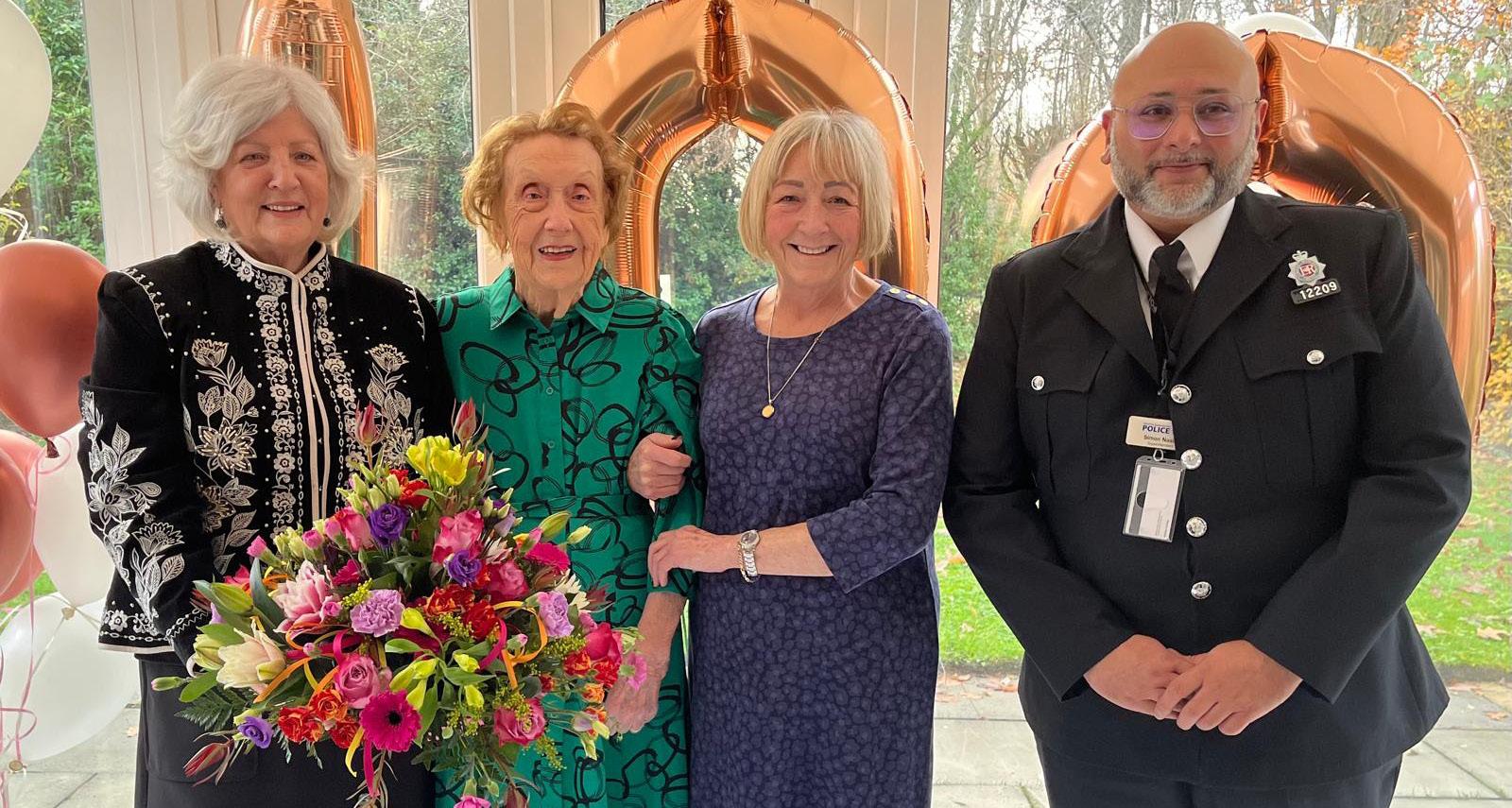


Congratulations to our football team who recently won against City of Manchester South in the Chief Constable’s Cup.
They are now on to the final group game which will be played against Bury on Monday 3 March at Heywood Sports Village.
The team was set up thanks to manager PC Andy Walsh, who wanted to improve morale by giving officers and staff something to look forward to and some downtime after working so hard. Assistant manager PC Ben Norton has also been an integral support and following a request Ben put in, the full team was recently kitted out thanks to Trafford Sports & Social.
This came as a welcome addition to the team as being a hand-me-down from Stockport, their previous kit was looking a little tired.
A big thank you to Trafford S&S which
is run by Anne Nicholas, Sergeant Rachel Nutsey and Superintendent Alicia Smith alongside a committee including PC Andy Walsh, Inspector Colin Dytor and Gail Murray.
The Trafford GMP team consists of a full mix of staff and officers from across the district, and the team had
been playing friendlies for a while until Inspector Tony Hanlon who runs the GMP teams with Inspector Andy Day resurrected the Chief Constable’s Cup which the team say gives them more of a competition feel.
Best of luck in Bury, team – we’ll all be rooting for you!
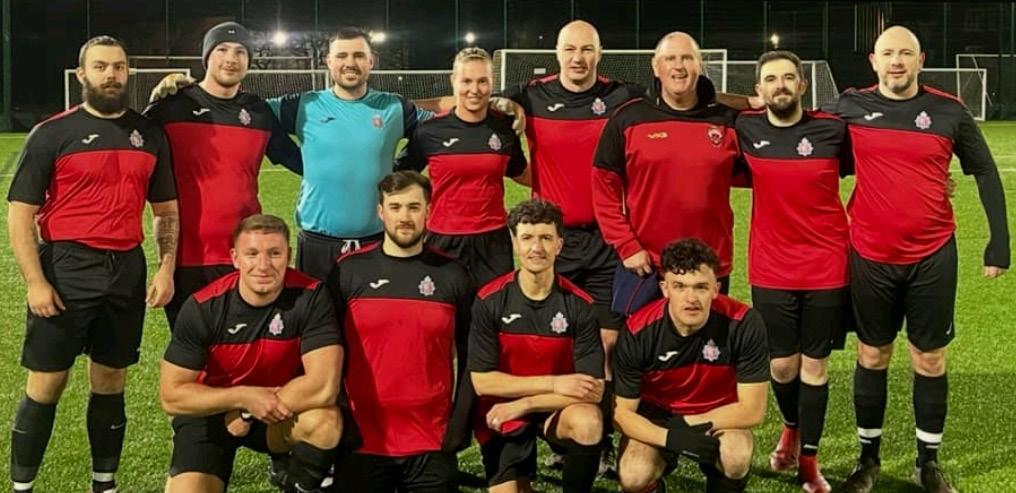
Throughout February, GMP alongside other UK police forces and law enforcement agencies ran a national firearms amnesty for Turkish manufactured Top-Venting Blank Firers (TVBF).
Although these firearms may have been lawfully purchased originally, they are now illegal under the Firearms Act 1968. People could hand these into stations across Greater Manchester, and if done during the month of February, it would not result in criminal prosecution.
However, after the amnesty period, anyone found to be in possession of a TVBF could face prosecution and to up to 10 years’ imprisonment.
What is a TVBF?
TVBFs are guns designed to fire blank cartridges only, featuring a fully blocked barrel. In the UK, these weapons could previously be owned without a licence unless classified as ‘readily convertible.’
However, recent findings indicate a rising connection between these firearms and criminal activities, such as intimidation and mimicking genuine handguns. Over 10,000 TVBFs are estimated to be in circulation in the
UK, and have been used in several serious criminal incidents, including four murders.
The models people are being asked to hand over are top-venting blank firers manufactured by any of the following:
• BLOW
• CEONIC
• EKOL
• RETAY
Other firearms can be surrendered during this period, as can all brands of blank firers, converted or otherwise.
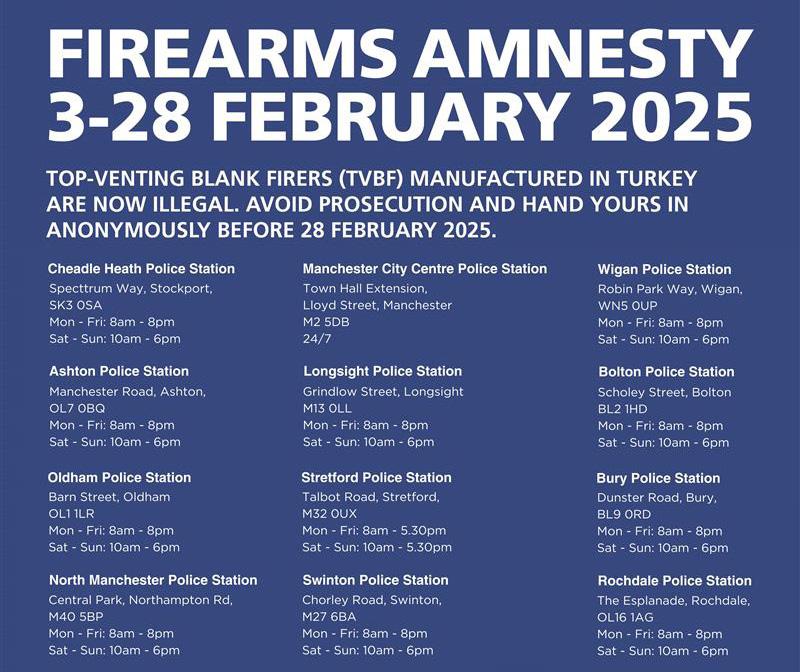
The Domestic Abuse Team (DAT) at Trafford is a dedicated group of professionals who work tirelessly to address and combat domestic abuse in the community.
The team consists of a combination of police constables (PCs) and detective constables (DCs).
The members of the DAT are trained in trauma-informed approaches, equipping them to provide sensitive and effective support to victims. They are skilled at recognising non-physical forms of abuse, such as emotional, financial, or coercive control, which can be just as damaging as physical violence.
Trafford’s Domestic Abuse Team make sure that victims of domestic abuse receive the protection and support they need while holding perpetrators accountable for their actions.
The team works meticulously to gather evidence, take statements, and ensure the safety of all involved. They work with victims to create personalised safety plans, providing advice on safe places to stay and actions to take in emergencies. Evidence collection is a critical aspect of their work, the team work collaboratively with prosecutors to make sure sufficient evidence is available to charge and
convict offenders, even if victims are hesitant to proceed.
An example of one of the teams’ cases is: Glynn Jones who was charged with controlling and coercive behaviour, TWOC, driving whilst disqualified and driving without insurance. The defendant subjects the victim to 12 months of violent abuse and control: taking money from her, checking her mobile phone, used derogatory language towards her, accused her of cheating, used and threatened violence towards her. The defendant plead guilty to controlling and coercive behaviour, and on 2 December 2024, he was sentenced to 19 months' imprisonment.
Another case is Nathanael Read who was charged with false imprisonment, two assaults, and possession of class B. The defendant locked the victim in the allotments, subjecting her to numerous assaults. When the defendant was arrested, he assaulted a PC and was found in possession of cannabis. On the 23 October 2024, the defendant plead guilty to assault, and he was sentenced to 12 months imprisonment. The defendant was also issued with a fiveyear restraining order.
Detective Chief Inspector Suzanne
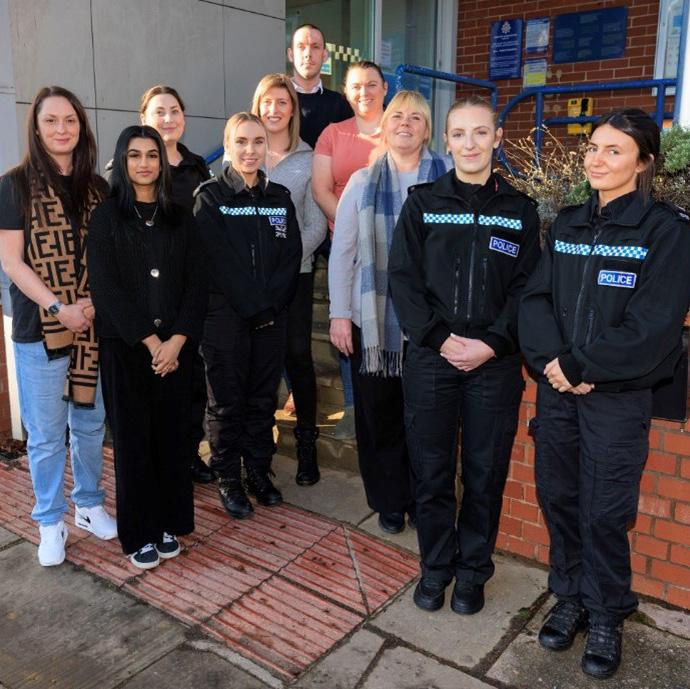
Keenaghan, vulnerability lead for Trafford, said “Domestic abuse is a harrowing reality faced by countless individuals, and tackling it requires a dedicated, skilled, and compassionate approach. At the forefront of this battle are Trafford’s Domestic Abuse Team. whose tireless work is vital in protecting victims and holding perpetrators accountable. Our officers are trained to handle some of the most complex and emotionally charged cases. They conduct meticulous investigations to build strong cases, often piecing together evidence from reluctant or traumatised victims.”
Officers were ‘consummate professionals’
NPO Lauren Nash and Sgt Lewis Armer were recently thanked by a member of the public (and former member of GMP!) for going ‘above and beyond’ to help when he was having problems with his car.
The motorist said: “Tonight two of your colleagues went above and beyond to assist me when my car got stuck on a hill due to icy conditions.
“Your officers arranged for more of their colleagues to bring bags of grit and a brush to melt the ice so I could get my car moving again. My car then ran out of fuel and PC 06681 kindly took me to a petrol station and then brought me back to where my car was.
“Both were consummate professionals; kind, polite and nothing was a problem. As a member of the public but also a former member of
GMP, I was truly humbled by their kindness and support and wanted to recognise them for their efforts and professionalism.
“GMP should feel privileged to have officers like these. Thank you both.”
Officer described as ‘an asset to GMP’
A former GMP special has written in to thank ‘Morgan’ (no other details provided – believed to be based at Altrincham or Stretford on response).
He said: “She supported my father after an assault and tended to him before the ambulance arrived. Her main focus was to ensure my father was looked after and she did this in a calm, collected manner.
“She’s an asset to GMP and one of the good guys.
“I was a special for some time and know what it takes to be a ‘good’ officer. Morgan was outstanding and
showcases GMP’s core values.”
‘Thank you for being so amazing!’
That’s how the two officers who attended an address in Sale were recently described (no names/collar nos provided).
The resident said: “Two officers called at my address this evening – it wasn’t an emergency but at the time I was really worried, hence why I made the call.
“I cannot begin to tell you how impressed I am!
“These officers went above and beyond. They were polite, friendly, thorough and ensured we felt safe before they left.
“I am so impressed with GMP, these officers are a credit to the force! Thank you for providing such an amazing service.”
‘Thank you for your diligence and good communication.’